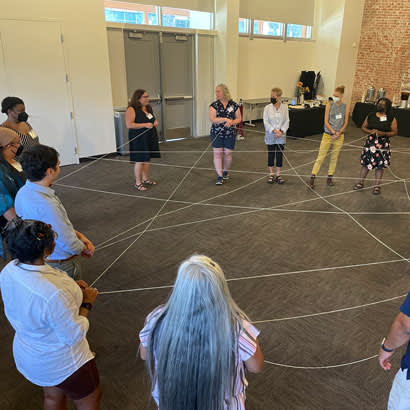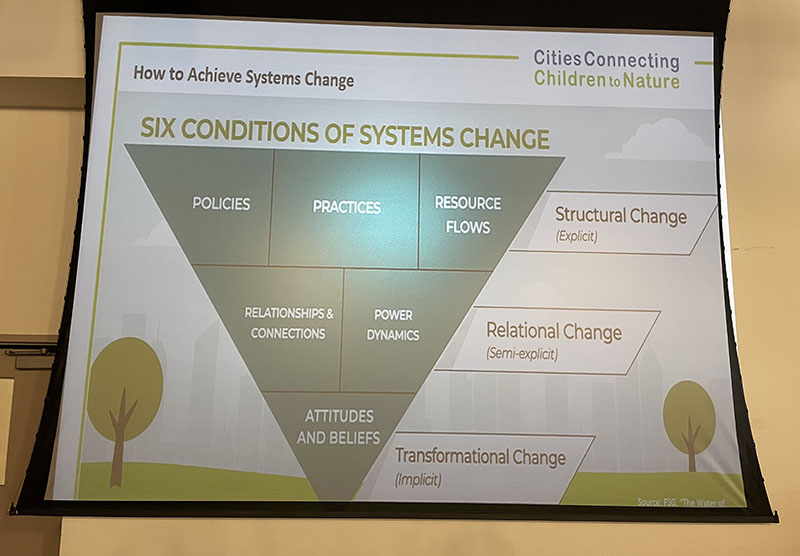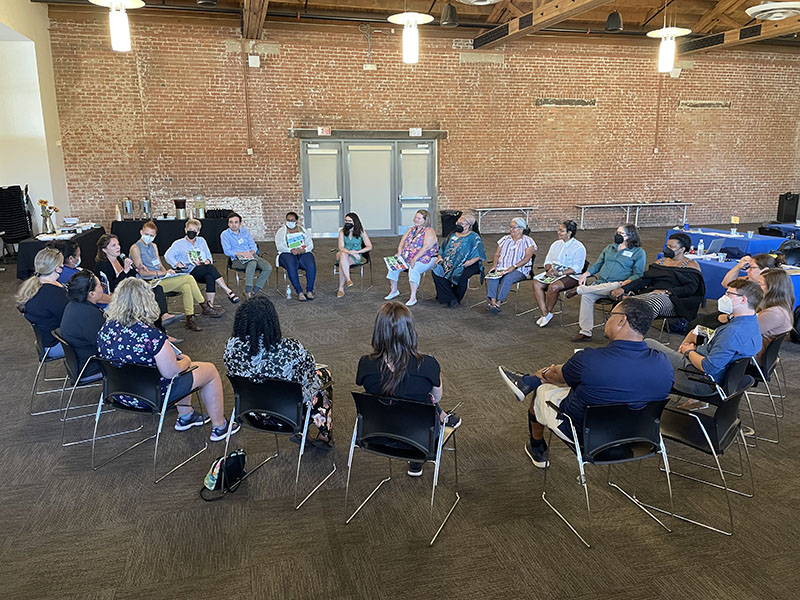
Pictured left: Attendees participate in an activity during NRPA's Resilient Park Access grantee cohort workshop prior to the 2022 NRPA Annual Conference in Phoenix, Arizona.
Ensuring equitable access to parks and nature is essential to park and recreation professionals' work. Having a clear understanding of what that means and how to ensure it is reached through system-level changes is vital to creating long-term solutions and success. Systems change is about advancing equity by shifting the conditions that hold the problem in place. By exploring what it truly means to understand and apply practical approaches to effect change, park and recreation professionals can advance their goals and ensure everyone benefits from nature.
NRPA and Children and Nature Network partnered to dive into the importance of systems change perspectives and application with a workshop for NRPA’s Resilient Park Access grantee cohort prior to the 2022 NRPA Annual Conference. The workshop provided an opportunity to break down and understand conditions that make up the systems change framework, as well as learn from other agencies.
What are the elements of systems change?
The three elements of systems change are structural change (policies, practices and resources), relational change (relationships and power dynamics) and transformational change (attitudes and beliefs). It is important to note that transformational change is typically the most challenging type of change to make. An example of transformational change that was shared during the workshop was how a community could choose to install a pool to promote learning to swim, as opposed to a splash pad that has historically been installed in response to the stereotype that “Black people don’t swim.”

Pictured: A graphic illustrating the six conditions of systems change.
A crucial part of understanding the elements of systems change is the importance of understanding your community’s needs. Authentic, equitable, and transformative community engagement is imperative. The workshop spent time delving into this as well as creating a more expansive definition of what it means to be outside. For instance, instead of asking community members what they want in a park, the more appropriate question to ask in terms of planning might be, “How do you like to use the park?” In order to best address a community’s needs, it is important to understand that community’s history and values.
To advance these efforts, attendees discussed the possibility of compensating community members for contributing their time through the entire process to help ensure equitable engagement of all people and groups. Additionally, attendees discussed implementing this engagement through structural changes by considering policies to ensure this is a practice moving forward. Others mentioned how they created an advisory panel of community members in an effort to strengthen the voice of that community, as well as shifting power to that group to make decisions from the beginning and throughout the planning process for their project. Many found this practice to be beneficial, speaking to both aspects of relational change.
Marilyn Montoya, a park advocate from Farmington, New Mexico, shared a story about how their project of building an all-abilities park came about. She mentioned that the idea came from speaking with a child who was in a wheelchair and had never been on a swing. After much research, Montoya approached her city manager with statistics about the number of children and adults who identified as special needs in the community and how there were no wheelchair-accessible amenities in their parks. While the city manager was unaware of this, it just so happened that he had a grandchild with certain disabilities. After taking his grandchild to an all-abilities park located 200 miles away and seeing how that child was able to play freely and not be stigmatized, he became a champion of making their parks accessible to everyone. This story not only embodied the element of systems change as it relates to changing attitudes and beliefs, but also spoke to the type of dialogue created in the workshop: personal stories that could help other agencies in their work.
Ensuring resources and support for equity-based efforts from leadership was also a topic discussed that impacts system change work. Through exploring the conditions, sharing examples and experiences within the group, and communicating how they applied to both project and master planning level elements, the session helped attendees understand how their current work contributes to systems change and how they can see their larger efforts within this lens.
The topic of systems change can be complicated, but by uplifting the work to create these changes, it illustrates how others can start this work or are already making progress. This work is a long-term process that requires building and stewarding relationships and advancing change to institutional practices and policies. The topic of systems change was timely for these grantees — and the field at large — to help find the right levers and ideas they need to advance change in their work and their communities.
In fact, one workshop attendee stated, “I needed this to reconnect as to why I’m passionate about this work.” Another attendee shared, “Our ultimate goal is not the project, but transforming our communities into park champions.”

Pictured: Workshop attendees discuss creating systems level change in parks and recreation.
If you are interested in exploring this topic and are looking for resources to assess where you are with systems change efforts and connecting your community with nature, please review Children and Nature Network's toolkit: Creating Systems Level Change in Cities.
Justin Taylor (he/him) is an NRPA program specialist.

